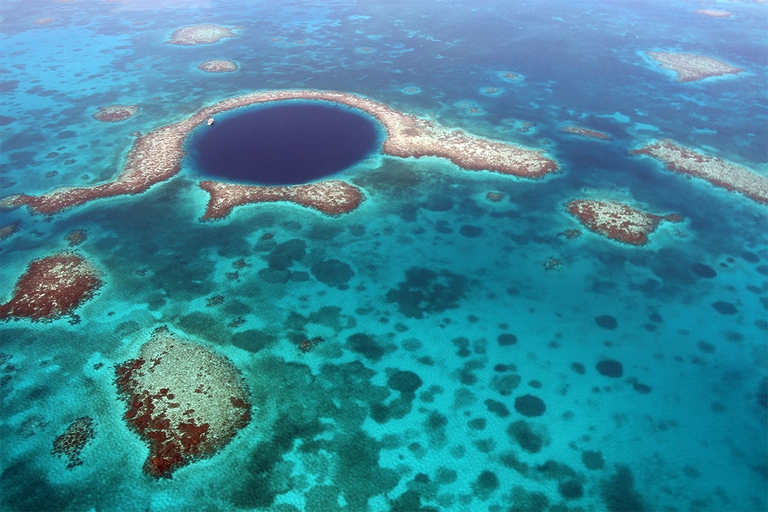
Quasi in 150mila hanno firmato un appello del Wwf al governo del Belize: salvi la seconda barriera corallina più grande del mondo e la Grande Voragine Blu.
The Belize coral reef was threatened by oil drills, but the population mobilised and the government listened. UNESCO has now removed it from the list of world heritage in danger.
After 10 years, the Belize barrier reef has been removed from the List of World Heritage in danger. The official decision was made on 26 June during a UNESCO World Heritage committee meeting held in Bahrain, in the Persian Gulf. It’s a victory for environmentalists who have been fighting to defend it for years, for the government that approved an ad hoc law, for Belize’s citizens who live off fishing and tourism and whose subsistence is bound to the territory’s health. But most of all, it is a victory for the Planet, that finally witnesses the safeguard of one of the most precious cradles of its biodiversity.
Vittoria in Belize ! #Belize #reef pic.twitter.com/1p2KpfkoAg
— WWF Roma (@WWF_Roma) 28 giugno 2018
Belize is a small state in central America, with a surface area equal to that of Tuscany. It is home to a 300 kilometre long coral reef, the second largest in the world, after Australia’s Great Barrier reef. It is the habitat of approximately 1,400 animal and plant species, including some endangered species like the hawksbill turtle, the manatee and at least six species of sharks. This is why it was declared a UNESCO heritage site in 1996. It is also a vital economic resource, since around 190,000 people live off fishing and tourism according to the estimates of WWF. All of this is found in a state that has just under 370,000 inhabitants and is not yet fully industrialised.
In 2009, the Belize barrier reef was included in UNESCO’s list of World Heritage in danger due to a series of complications, including the “selling of land to private buyers, the destruction of mangroves and offshore oil explorations”. Many decisive steps forward were taken since then. In 2016 tens of thousands of people responded to the WWF’s plea asking the government to halt all oil exploration activities in territorial water. The government answered at the beginning of this year, with a revolutionary law that says “no more” oil, transforming this tiny Central American nation into a pioneer of ocean protection.
This path convinced UNESCO experts to declare the Belize coral reef safe, for now. According to Mechtild Rossler, leader of the UNESCO world heritage centre, this result “shows the power of the collective action of governments, UNESCO, IUCN and civil society, and it sets a god example for the rest of the world”.
Siamo anche su WhatsApp. Segui il canale ufficiale LifeGate per restare aggiornata, aggiornato sulle ultime notizie e sulle nostre attività.
![]()
Quest'opera è distribuita con Licenza Creative Commons Attribuzione - Non commerciale - Non opere derivate 4.0 Internazionale.
Quasi in 150mila hanno firmato un appello del Wwf al governo del Belize: salvi la seconda barriera corallina più grande del mondo e la Grande Voragine Blu.
Australia’s Great Barrier Reef with its multi-coloured biodiversity, Madagascar’s rainforests with their lemurs, Tanzania’s natural reserves, and Szechuan giant panda sanctuaries in China. These and many others natural and cultural treasures are at risk due to human-related economic activities. A report carried out by WWF shows that at least 114 out of 229 World Heritage
L’associazione ambientalista lancia un appello agli investitori affinché non finanzino più le attività estrattive pericolose per l’ambiente.
A report by Ember explains that in 2025 electricity generation from renewables (solar, wind and hydropower) surpassed that from fossil fuel sources.
The Tyler Prize, considered the “Nobel Prize for the Environment,” has been awarded to Toby Kiers, an American biologist working in Amsterdam.
Belgium is one of the countries most exposed to climate change. Dune–dikes are a solution to curb sea-level rise.
Between October 2024 and September 2025, the average temperature in the Arctic was 1.6 degrees Celsius higher than during the 1991–2020 period.
Undeclared conflicts of interest, paid authors, lack of transparency: one of the most cited studies on glyphosate, published in 2000, has been retracted.
The Copernicus service has released data for the first eleven months of 2025: global warming is set to come close to last year’s record.








